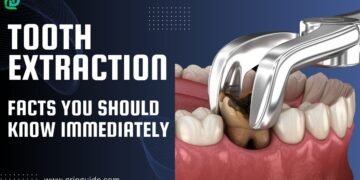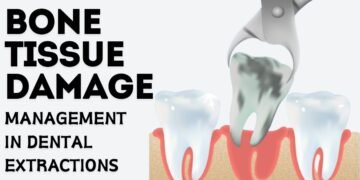Table of Contents
After the first few days from Wisdom Tooth Removal Surgery, the pain and swelling should gradually subside, and you may start to feel more comfortable. However, it is important to note that everyone’s recovery process is different, and some individuals may experience a longer healing time.
During the recovery period, it is crucial to take care of your oral health to prevent any complications. This includes:
- avoiding smoking or using tobacco products, as they can delay the healing process and increase the risk of infection.
- It is also important to refrain from drinking through a straw, as the suction can dislodge the blood clot that forms in the socket and lead to a condition called dry socket.
- In addition to following a soft food diet, it is essential to stay hydrated during the recovery period. Drinking plenty of water can help flush out any bacteria and promote healing. However, it is important to avoid drinking extremely hot or cold beverages, as they can cause sensitivity and discomfort.
- Rest: During the first few days, it is recommended to get plenty of rest and avoid strenuous activities. This will allow your body to focus on healing and reduce the risk of complications. It is also important to keep your head elevated while sleeping to minimize swelling.
If you experience any severe pain, excessive bleeding, or signs of infection, such as fever or pus, it is crucial to contact your dentist or oral surgeon immediately. They will be able to assess your condition and provide appropriate treatment if necessary.
Overall, the recovery from wisdom tooth removal is a process that requires patience and proper care. By following your dentist’s instructions and taking the necessary precautions, you can ensure a smooth and successful recovery.
Side Effects of Wisdom Tooth Removal
Like any surgical procedure, there are potential side effects associated with wisdom tooth removal. These side effects can vary from person to person and may include:
1. Pain and swelling in the surgical area
Pain and swelling are common side effects after wisdom tooth removal, but they can usually be managed with over-the-counter pain medications and cold compresses. However, if the pain worsens or persists beyond a few days, it is important to contact your dental professional for further evaluation and treatment.
2. Bleeding
Bleeding is another common side effect, especially immediately after the procedure. Your dentist or oral surgeon will provide you with specific instructions on how to control bleeding, such as biting down on gauze pads or applying gentle pressure with a clean cloth. If the bleeding does not subside or becomes excessive, it is important to seek immediate dental care.
3.Difficulty opening the mouth fully
Difficulty opening the mouth fully and stiffness in the jaw muscles are also common side effects, particularly if the wisdom teeth were impacted or required more extensive surgical intervention.
These side effects usually improve over time as the tissues heal, but gentle jaw exercises and warm compresses can help alleviate discomfort.
4.Temporary numbness or tingling in the lips, tongue, or chin
Temporary numbness or tingling in the lips, tongue, or chin can occur if the nerves in the area are affected during the extraction process. This side effect is usually temporary and resolves on its own within a few weeks.
However, if the numbness or tingling persists or worsens, it is important to notify your dental professional for further evaluation.
5. Infection
Infection is a potential side effect of any surgical procedure, including wisdom tooth removal. Your dentist or oral surgeon will provide you with instructions on how to care for the surgical site to minimize the risk of infection.
This may include:
- rinsing with an antimicrobial mouthwash
- avoiding certain foods that can irritate the area
- and taking prescribed antibiotics if necessary.
6. Dry socket
Dry socket is a relatively rare but painful complication that can occur after wisdom tooth removal. It happens when the blood clot that normally forms in the extraction site becomes dislodged or dissolves, exposing the underlying bone and nerves.
This can result in severe pain and an increased risk of infection. Your dental professional will provide you with specific instructions on how to prevent dry socket, such as avoiding smoking, using straws, or vigorous rinsing for a certain period of time after the procedure.
If you experience severe pain that does not respond to pain medications or notice a foul odor or taste in your mouth, it is important to contact your dental professional for evaluation and treatment.
In conclusion, while there are potential side effects associated with wisdom tooth removal, following your dentist or oral surgeon’s post-operative instructions and seeking prompt dental care if needed can help minimize the risk of complications and ensure a smooth recovery process.
Post-Operative Care and Restrictions
After wisdom tooth removal, it is important to take certain precautions and avoid certain activities to promote proper healing and minimize the risk of complications. Your dentist or oral surgeon will provide you with specific post-operative instructions, but here are some general guidelines:
1. Avoid vigorous rinsing or spitting for the first 24 hours
During the first 24 hours after wisdom tooth removal, it is crucial to avoid vigorous rinsing or spitting. This is because these actions can dislodge the blood clot that forms in the socket, which is essential for proper healing.
Instead, you should gently dab your mouth with a clean tissue or gauze to absorb any excess saliva or blood.
2.Avoid using a straw
Using a straw can also be detrimental to the healing process. The suction created when drinking through a straw can disrupt the blood clot and increase the risk of developing a dry socket. It is best to drink fluids directly from a cup or glass during the initial recovery period.
3. Avoid smoking and drinking alcohol
Smoking and drinking alcohol should be avoided for at least 72 hours after the surgery. Smoking not only introduces harmful chemicals into the mouth but also creates suction that can dislodge the blood clot. Alcohol, on the other hand, can interfere with the healing process and increase the risk of bleeding.
4. Avoid strenuous physical activity
Engaging in strenuous physical activity should be avoided for at least a week after wisdom tooth removal. Activities such as running, weightlifting, or intense sports can increase blood pressure and cause bleeding at the surgical site.
It is important to give your body time to heal and avoid any activities that could disrupt the recovery process.
5.Eat soft foods and avoid hard, chewy, or spicy foods
In terms of diet, it is recommended to stick to soft foods for the first few days after the surgery. This includes foods such as yogurt, mashed potatoes, soup, and smoothies.
Avoiding hard, chewy, or spicy foods is essential to prevent any irritation or damage to the surgical site. As the healing progresses, you can gradually introduce solid foods back into your diet.
6.Gently brush your teeth, avoiding the surgical area
Proper oral hygiene is crucial during the recovery period. You should continue to brush your teeth gently, avoiding the surgical area to prevent any unnecessary irritation.
7. Rinse your mouth with warm saltwater
Rinsing your mouth with warm saltwater can also help keep the area clean and promote healing. Your dentist or oral surgeon will provide you with specific instructions on how often to rinse and the proper technique to use.
8. Take any prescribed medications
Lastly, it is important to take any prescribed medications as directed. This may include antibiotics to prevent infection or pain medication to manage discomfort. It is essential to follow the prescribed dosage and complete the full course of medication to ensure optimal healing.
By adhering to these post-operative care guidelines, you can support the healing process and minimize the risk of complications. However, it is important to consult with your dentist or oral surgeon for personalized instructions and to address any concerns or questions you may have.
Age for Wisdom Tooth Removal
The timing for wisdom tooth removal can vary depending on several factors, including the development and position of the teeth, the presence of symptoms or problems, and the individual’s overall oral health.
Wisdom teeth typically start to erupt between the ages of 17 and 25, although this can vary from person to person. In some cases, the wisdom teeth may erupt without causing any problems and can be left in place.

However, if the wisdom teeth are impacted (meaning they are unable to fully erupt) or if they are causing pain, infection, or damage to surrounding teeth, they may need to be removed.
The decision to remove wisdom teeth should be based on an individual assessment by a dental professional. They can evaluate the specific situation and provide personalized recommendations.
In some cases, it may be recommended to remove the wisdom teeth as soon as they start to cause problems, while in other cases, it may be best to wait and monitor the situation.
During the assessment, the dentist will consider various factors such as the position and alignment of the wisdom teeth, the size of the jaw, and the overall oral health of the individual. They may also take into account the patient’s age, as younger individuals tend to recover more quickly from the procedure.
While it is generally recommended to remove impacted wisdom teeth, there are cases where it may be appropriate to leave them in place. For example, if the teeth are not causing any symptoms or problems and are not likely to in the future, the dentist may advise against removal.
It is important to attend regular dental check-ups so that your dentist can monitor the development of your wisdom teeth and provide appropriate guidance and treatment when necessary. Regular check-ups can help identify any potential issues early on and prevent complications from arising.
In conclusion, the age for wisdom tooth removal can vary depending on individual circumstances. It is best to consult with a dental professional who can assess the specific situation and provide personalized recommendations.
Whether to remove the wisdom teeth or not will depend on factors such as the presence of symptoms, the position of the teeth, and the overall oral health of the individual.
Before undergoing wisdom tooth removal, it is important to have a thorough consultation with your dental professional. During this consultation, the dentist or oral surgeon will evaluate your dental health and any potential risks associated with the procedure.
They will take into consideration factors such as the position of your wisdom teeth, the presence of any infections or cavities, and the overall health of your gums and jawbone.
During the actual procedure, your dental professional will take all necessary precautions to ensure your safety. This may include administering local anesthesia or sedation to minimize any discomfort or pain during the surgery.
They will also use sterile instruments and follow strict infection control protocols to prevent the spread of any bacteria or viruses.
In some cases, the removal of wisdom teeth may be more complex due to factors such as impacted teeth or proximity to nerves and blood vessels.
In these situations, your dental professional may refer you to an oral surgeon who specializes in more complex extractions. This ensures that you receive the highest level of care and reduces the risk of complications.
Pain and Discomfort
Wisdom tooth removal can be a painful procedure, but the level of pain experienced can vary from person to person. Some individuals may only experience mild discomfort, while others may experience more intense pain.
Your dentist or oral surgeon will typically administer local anesthesia to numb the area before the surgery. This helps to minimize pain during the procedure. After the surgery, you may be prescribed pain medication to help manage any post-operative pain.
In addition to pain, you may also experience some swelling and bruising in the area where the wisdom teeth were removed. Applying an ice pack to the affected area can help reduce swelling and alleviate discomfort.
If you experience severe or prolonged pain, or if you have any concerns about your recovery, it is important to contact your dentist or oral surgeon for further guidance.
It is worth noting that the pain and discomfort experienced after wisdom tooth removal can vary depending on several factors, including the complexity of the extraction, the individual’s pain tolerance, and the overall healing process.
Some individuals may have a relatively smooth recovery with minimal pain, while others may experience more significant discomfort.
During the first few days after the surgery, it is common to experience some degree of pain and swelling. This can make eating and speaking uncomfortable, and it is important to follow a soft food diet and avoid any activities that could potentially disrupt the healing process.
It is also advisable to avoid smoking and drinking through straws, as these actions can create suction in the mouth and increase the risk of complications.
While over-the-counter pain medications can help alleviate the discomfort, it is important to follow the prescribed dosage and consult with your dentist or oral surgeon if the pain persists or worsens.
They may recommend a stronger pain medication or suggest additional measures to manage the pain, such as using warm saltwater rinses or applying a topical numbing gel.
Swelling is a common side effect after wisdom tooth removal and can last for several days. To reduce swelling, applying an ice pack to the affected area for 15-20 minutes at a time can be helpful. It is important to wrap the ice pack in a thin cloth to protect the skin from direct contact with the cold. Additionally, keeping your head elevated while resting can help minimize swelling.
While pain and discomfort are normal after wisdom tooth removal, it is essential to monitor your recovery closely and seek professional advice if you have any concerns.
Your dentist or oral surgeon will be able to provide guidance and reassurance throughout the healing process, ensuring a smooth and comfortable recovery.
The Changing Perspective on Wisdom Tooth Removal
There has been a shift in recent years regarding the recommendation for wisdom tooth removal. Previously, it was common practice to remove wisdom teeth as a preventive measure, even if they were not causing any immediate problems.
However, experts now recognize that not all wisdom teeth need to be removed. If the wisdom teeth are healthy, properly positioned, and can be easily cleaned, they may not need to be extracted.
The decision to remove wisdom teeth should be based on an individual assessment of the risks and benefits. Some of the reasons why experts now say not to remove wisdom teeth include:
Risks associated with surgery
Wisdom tooth removal is a surgical procedure that carries certain risks, such as infection, nerve damage, and damage to surrounding teeth or structures.
If the wisdom teeth are not causing any problems and are not at risk of causing problems in the future, the potential risks of surgery may outweigh the benefits.
However, it is important to note that in some cases, the risks of not removing the wisdom teeth may be greater than the risks of the surgery.
Improved oral hygiene practices
With proper oral hygiene practices, including regular brushing, flossing, using interdental brush and dental check-ups, it is possible to maintain good oral health even with wisdom teeth present.
If the wisdom teeth can be easily cleaned and do not pose a risk of decay or gum disease, they may not need to be removed. However, it is important to note that not all individuals are able to effectively clean their wisdom teeth, and in some cases, the presence of wisdom teeth can make it more difficult to maintain good oral hygiene.
Individual assessment
Each person’s situation is unique, and the decision to remove wisdom teeth should be based on an individual assessment of the risks and benefits.
Factors such as the position of the wisdom teeth, the presence of symptoms or potential problems, and the individual’s overall oral health should be taken into consideration. It is important to consult with a dentist or oral surgeon who can evaluate your specific situation and provide personalized recommendations.
If you are unsure whether or not your wisdom teeth need to be removed, it is best to consult with your dentist or oral surgeon. They can evaluate your specific situation and provide you with personalized recommendations.
Ultimately, the decision to remove wisdom teeth should be made on a case-by-case basis, taking into consideration the individual’s unique circumstances and the potential risks and benefits involved.
Wisdom Tooth Removal Without Anesthesia
Wisdom tooth removal is typically performed under local anesthesia to numb the area and minimize pain during the procedure. However, in some cases, such as when the wisdom teeth are impacted or when multiple teeth need to be removed, general anesthesia may be used to ensure the patient’s comfort.
Undergoing wisdom tooth removal without anesthesia can be extremely painful and is not recommended. The procedure involves removing the tooth from the jawbone, which can be a complex and invasive process.
Without anesthesia, the patient would likely experience intense pain and discomfort throughout the procedure.
Additionally, the absence of anesthesia can also lead to increased anxiety and stress for the patient. The fear of pain and the anticipation of the surgical procedure can cause heightened levels of stress, making it more challenging for the dentist or oral surgeon to perform the extraction efficiently.
Anxiety can also result in muscle tension, making it harder for the dentist to access and remove the tooth effectively.
Furthermore, without anesthesia, the patient may have difficulty staying still during the procedure. The pain and discomfort can cause involuntary movements, which can increase the risk of accidental injury to the patient or the dental professional.
Anesthesia helps to keep the patient calm and relaxed, ensuring a safer and more controlled environment for the extraction.
If you have concerns about anesthesia or are interested in alternative options for pain management during the procedure, it is best to discuss these with your dentist or oral surgeon.
They can provide you with information about the different types of anesthesia available and help you make an informed decision based on your individual needs and preferences.
Summary
In conclusion, while there are risks associated with wisdom tooth removal, the procedure is generally safe when performed by a qualified dental professional.
By following proper protocols and guidelines, you can minimize these risks and ensure a smooth recovery. If you have any concerns or questions about the safety of wisdom tooth removal, it is always best to consult with your dental professional who can provide you with personalized advice based on your specific situation.
FAQs
-
When is wisdom tooth removal necessary?
if the wisdom teeth are impacted (meaning they are unable to fully erupt) or if they are causing pain, infection, or damage to surrounding teeth, they may need to be removed.
-
Do all wisdom teeth need to be removed?
experts now recognize that not all wisdom teeth need to be removed. If the wisdom teeth are healthy, properly positioned, and can be easily cleaned, they may not need to be extracted.
The decision to remove wisdom teeth should be based on an individual assessment of the risks and benefits.
-
What are the risks of wisdom tooth removal?
Like any surgical procedure, there are potential side effects associated with wisdom tooth removal. These side effects can vary from person to person and may include: Pain, dry socket, infection, damage to nearby teeth (rare).








